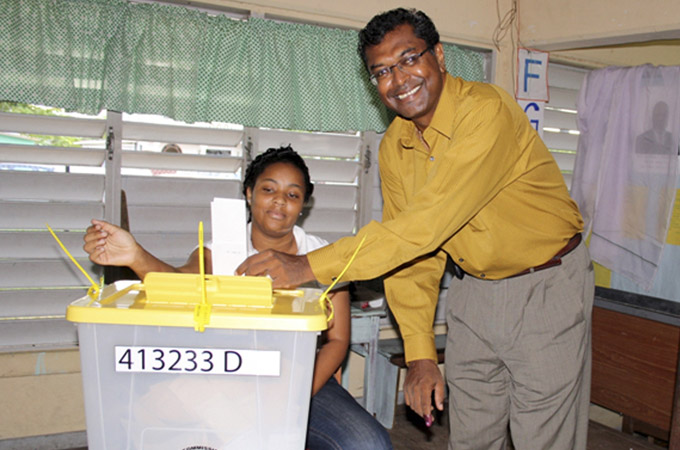Ruling party wins presidency in Guyana
Donald Ramotar’s victory marks the fifth straight presidential election won by the South American nation’s ruling party.

 |
| Opposition candidate Khemraj Ramjattan cast his ballot amid rumours that elections were rigged [Reuters] |
Guyana’s ruling party has won a fifth straight presidential election, the South American nation’s electoral commission said, as opposition parties claimed that the vote was rigged.
“On the basis of this declaration, Mr. Donald Ramotar has won the presidency and will be sworn in shortly,” chief elections officer Gocool Boodhoo told reporters on Thursday.
|
“I think this [protest] is an expression of anger, because people think this election has been rigged and they are not going to accept the presidency of Ramotar.” – Tom Dalgety, Guyanese resident |
He said the People’s Progressive Party/Civic (PPP/C) took 49 per cent of the votes cast, narrowly losing its parliamentary majority for the first time in 19 years. The opposition coalition led by David Granger, A Partnership for National Unity (APNU), received 41 per cent.
The two main opposition parties together now hold one seat more than the PPP/C, which will make governing more difficult for Ramotar than during the two terms of his predecessor, Bharrat Jagdeo.
“It’s clear here that parts of our population have rejected the policies of the government,” said Nigel Hughes of the Alliance For Change, a third party that had urged Guyanese to end a decades-old tradition of voting along racial lines.
International observers broadly gave the election a clean bill of health, and electoral authorities in the former British colony of 750,000 people had called on both political camps to be patient and wait for the final results.
‘Rigged’ elections
A group of several hundred mostly Afro-Guyanese demonstrators gathered outside the parliament building on Thursday, shouting, “We want Granger!” and “APNU!”
“I think this is an expression of anger, because people think this election has been rigged and they are not going to accept the presidency of Ramotar,” Tom Dalgety, a 72-year-old chemist who joined the protest, said.
The group pushed towards the parliament gate, but security officials convinced them to back off, at which point they began marching around the block.
Guyana, on the Atlantic shore between Venezuela, Suriname and Brazil, is South America’s fourth-largest bauxite miner and also a producer of gold, sugar and timber.
Politically, it is divided between African descendants, who tend to support the APNU and ethnic Indians who have generally backed the PPP/C.
Both groups coexist peacefully most of the time. But black Guyanese often complain they are locked out of jobs and denied opportunities by predominantly Indian descendants.
Racial tensions have triggered riots and looting in the past, especially during elections.
A decade ago, several people were killed during post-vote violence.
The PPP/C party is credited with building roads, schools and hospitals while leading the country out of economic chaos during the 1980s. The APNU pointed to government corruption and a high crime rate as reasons for a change.